BEIRUT // A key member of Lebanon's fragile coalition has pulled out of the latest round of national dialogue talks scheduled for this week because of one issue that remains off the table: Hizbollah's continued presence as the most powerful armed force in the country. The leader of the Lebanese Forces - the militia group founded during Lebanon's 1975-91 civil war and subsequently reinvented as a political party - Samir Geagea, will not attend Thursday's talks, part of a dialogue which began in 2008 as an effort to dampen sectarian tensions in the fractious nation, because the president Michel Suleiman has already announced that Hizbollah's weapons will not be on the agenda.
Mr Geagea has claimed he will not attend the talks because of a scheduling conflict, but has done little to hide his disgust that the discussion will avoid what is perhaps the most important issue for Lebanon. As the last member of the anti-Syrian March 14 coalition still publically opposed to the militant Shiite group's strangehold on weapons in southern Lebanon, Mr Geagea has staked out some lonely political territory. Hizbollah are believed to be overwhelmingly stronger than the Lebanese army in the region.
Mr Geagea's allies of the last five years have abandoned him for reconciliation with both Damascus and Hizbollah's top official, Hassan Nasrallah. As the most widely respected leader among the March 14 Christian parties, Mr Geagea speaks for much of Lebanon's right-leaning Christian community, drawing support from his role as a top militia commander during the civil war. But it is that same reputation for military prowess and ruthlessness that sees him widely vilified as a traitor by Muslims throughout Lebanon, including Hizbollah supporters, who see him as a one-time ally of Israel who bitterly fought his Muslim countrymen. To his supporters, Mr Geagea is not just a famed military commander who protected Christian interests in Lebanon, but a popular hero on the scale of Nelson Mandela. He was the only major militia commander from the civil war era to be jailed after the conflict for his continued opposition to Syria's post-war occupation.
Released from his 11-year stint in solitary confinement just after the Syrian departure in 2005, Mr Geagea has repeatedly cautioned his followers against pursuing violence while maintaining a constant drumbeat of criticism against Hizbollah and its allies, at home and abroad. "People, territory and several authorities cannot exist at the same time," he said last month, denouncing the group's formation of its own state apparatus. "That's why, despite our appreciation of Hizbollah's efforts in previous stages, we call for all efforts to be co-ordinated within the state and its legal and constitutional institutions."
He followed this criticism a week later by claiming that far from being guardians of Lebanon's security, Hizbollah actually threatens the survival of the state through its animosity towards neighbouring Israel. "Hizbollah is placing Lebanon in the face of Israel by putting it in a position where we don't know if the nation will survive," Mr Geagea said. From 2005 to 2009, statements such as these from a March 14 politician were perfectly common, but his allies in that movement, including the prime Minister, Saad Hariri, and Walid Jumblatt, the Druze chieftain, have changed political course.
Mr Geagea's refusal to temper his rhetoric might play well among segments of Lebanon's Christian community, but it has drawn unwelcome attention from Hizbollah and its supporters, who see him as an Israeli agent and war criminal more than a political figure. "Geagea needs to watch his mouth or one of these days, his Christian opponents might suddenly be a lot stronger and well armed," joked a Hizbollah political supporter with close ties to the group's military wing, in a recent interview. "Some of our guys might have to put on Aoun T-shirts and head up to the mountains and teach him to keep his mouth shut," he added, referring to Hizbollah's top Christian ally, Michel Aoun.
But Elias Muhanna of the QifaNabki.com political blog said Mr Geagea had carved out a special place in Lebanon's political landscape, ironically following the lead of his arch rival in the Christian community, Mr Aoun. "Geagea is the only member of March 14 who still publicly opposes Hizbollah, and he seems to be playing the long game," he said. "Just as Michel Aoun benefited from anti-Hariri sentiment in the Christian community when he returned to Lebanon in 2005, Geagea is betting that many former Aoun supporters will eventually grow disillusioned with [Aoun's alliance] if Hizbollah continues to become more powerful in Lebanon."
@Email:mprothero@thenational.ae





